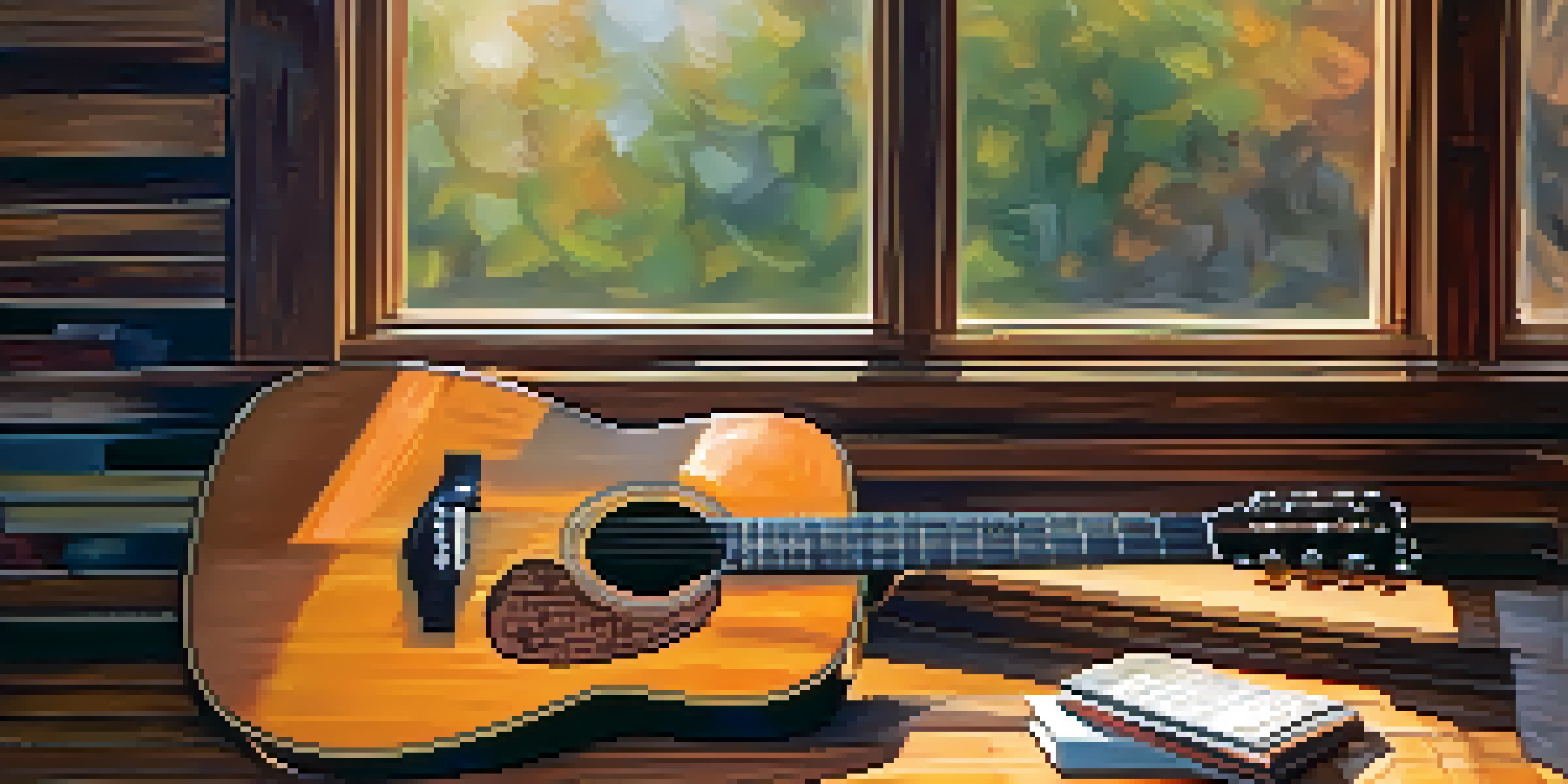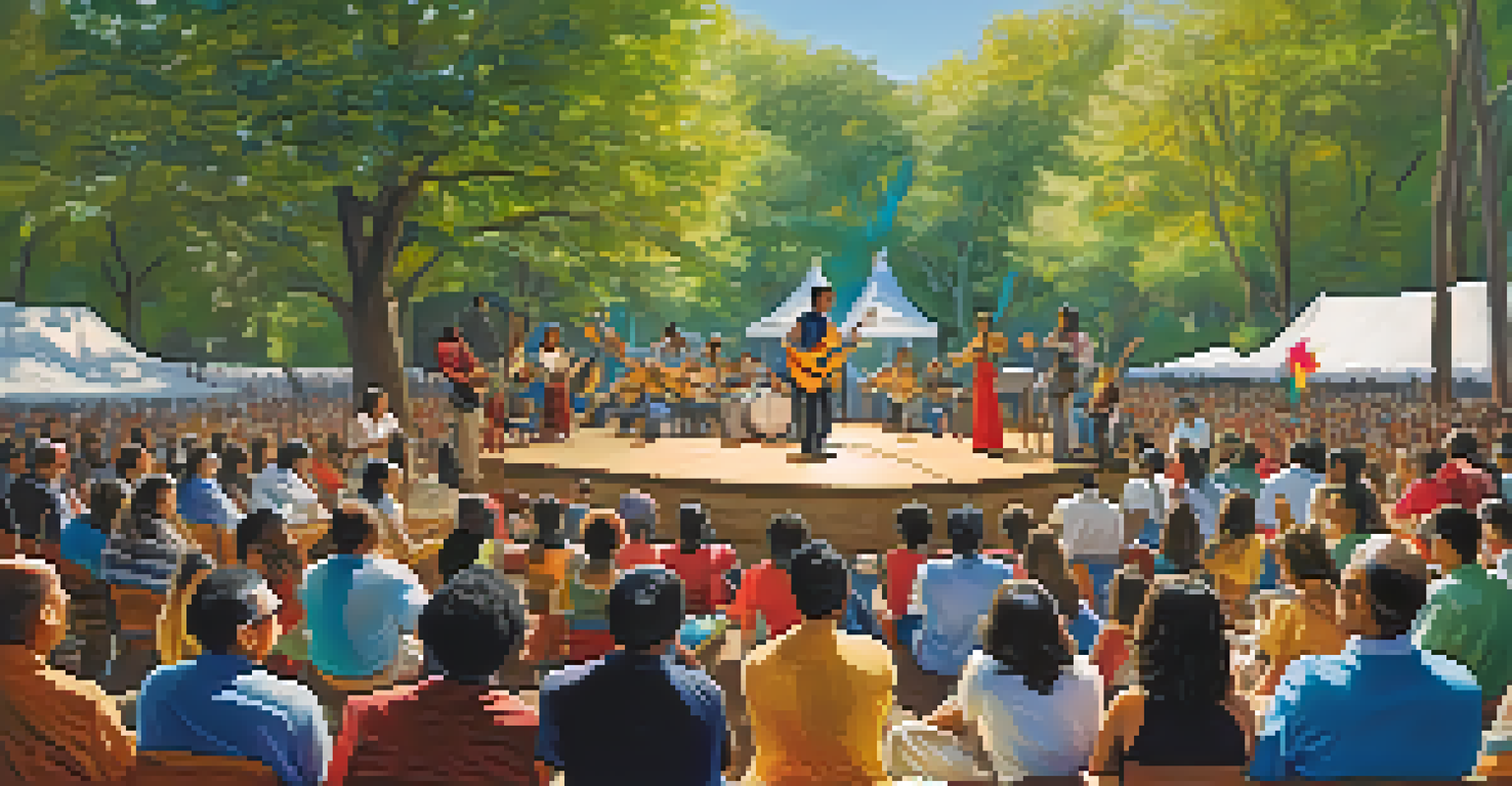Cultural Rhythms: Guitar's Role in Global Exchange

The Guitar: A Universal Instrument Across Cultures
The guitar, with its rich tones and versatile sound, serves as a bridge connecting various cultures. From the flamenco rhythms of Spain to the blues of the American South, this instrument has adapted and evolved, reflecting the essence of different musical traditions. Its ability to blend into a variety of genres makes it a favorite among musicians worldwide.
Music is the universal language of mankind.
Many cultures have embraced the guitar, integrating it into their unique musical expressions. For instance, in Brazil, the guitar is central to bossa nova, a genre that marries samba with jazz influences. Similarly, in Africa, acoustic guitars are often used to enhance traditional storytelling and folk music, showcasing the instrument's versatility.
As musicians travel and share their sounds, the guitar becomes a tool for cultural exchange. It allows artists to collaborate, experiment, and create new genres that blend elements from their respective backgrounds. This cross-pollination not only enriches the music but also fosters understanding and appreciation among diverse cultures.
The Role of the Guitar in Folk Traditions
Folk music often tells the stories of a community, and the guitar plays a pivotal role in this narrative. Across the globe, from the Appalachian hills to the Andean mountains, local musicians use the guitar to express their cultural identities and share their histories. These folk traditions preserve the essence of a culture and pass it down through generations.

In many regions, the guitar is used during festivals, gatherings, and ceremonies, highlighting its significance in communal life. For example, the traditional music of Mexico features the guitar prominently in mariachi bands, celebrating joyous occasions and cultural heritage. This communal aspect emphasizes the guitar's role not just as a musical instrument but as a symbol of unity.
Guitar as a Cultural Connector
The guitar serves as a bridge between various cultures, facilitating musical collaboration and fostering appreciation of diverse traditions.
Moreover, as folk musicians share their songs, they inadvertently invite others into their cultural stories. This sharing fosters a sense of belonging and encourages the exploration of different cultural narratives. Through the guitar, the intricate tapestry of human experience is woven together, showcasing the power of music to transcend boundaries.
Guitar Innovations: Fostering Global Collaborations
Innovations in guitar design and technology have opened new avenues for collaboration among musicians worldwide. Electric guitars, for example, introduced dynamic sounds that transformed various genres, from rock to reggae. This evolution not only changed the music landscape but also encouraged cross-genre experimentation and partnerships.
The guitar is a miniature orchestra in itself.
Artists are now able to collaborate remotely, sharing their unique sounds and styles through digital platforms. With the help of social media, musicians can connect with others across the globe and create blended music that showcases their individual backgrounds. This accessibility has led to a rich tapestry of global music that reflects a multitude of influences.
These collaborations often result in groundbreaking projects that merge different cultural elements. When artists from varied backgrounds come together, they create a dialogue through music that transcends language barriers. The guitar, in these collaborations, acts as a common thread weaving diverse stories into a single, harmonious composition.
The Guitar's Influence on Popular Music Genres
Throughout the years, the guitar has left an indelible mark on popular music genres, shaping their identity and sound. From rock and pop to jazz and country, the guitar has been at the forefront, influencing countless artists and bands. Its versatility allows it to adapt to changing musical landscapes, making it an essential tool for songwriters and performers.
For instance, the birth of rock 'n' roll in the 1950s showcased the electric guitar's power, with artists like Chuck Berry and Elvis Presley leading the charge. This genre not only revolutionized music but also had a profound impact on culture and society, bringing together diverse audiences. The guitar became emblematic of youth rebellion and freedom during this transformative era.
Preserving Cultural Heritage
Guitar music plays a crucial role in preserving cultural narratives and traditions, ensuring they are passed down through generations.
Similarly, in the realm of jazz, the guitar has found a unique place alongside traditional instruments like the piano and saxophone. Jazz guitarists like Wes Montgomery and Django Reinhardt have elevated the instrument's status, showcasing its ability to improvise and create intricate melodies. This influence continues to inspire new generations of musicians, further solidifying the guitar's role in popular music.
Education and the Global Spread of Guitar Music
Music education plays a vital role in spreading the love of the guitar across the globe. Schools and community programs often include guitar classes, introducing young learners to this versatile instrument. By doing so, they not only cultivate talent but also instill an appreciation for various musical styles and cultural expressions.
Online platforms have also emerged as powerful tools for guitar education, allowing aspiring musicians to learn from instructors worldwide. These resources provide access to different techniques, styles, and cultural backgrounds, enriching the learning experience. The internet has effectively democratized music education, making it more inclusive and diverse.
As students delve into guitar music from different cultures, they develop a broader understanding of global traditions. This exposure fosters a sense of curiosity and respect for artistic expressions beyond their own. Ultimately, music education through the guitar nurtures a new generation of musicians who are more connected to the world around them.
The Cultural Significance of Guitar Festivals
Guitar festivals serve as vibrant gatherings that celebrate the instrument's cultural significance. These events attract musicians and fans from around the world, creating a melting pot of sounds, styles, and stories. From small local gatherings to large international festivals, these celebrations highlight the guitar's role in uniting diverse communities through music.
At festivals, attendees have the opportunity to witness performances by artists representing various cultures, each showcasing their unique style. These events often feature workshops, masterclasses, and jam sessions, encouraging collaboration and interaction among musicians. This hands-on experience fosters a sense of camaraderie and shared passion for the guitar.
Guitar Festivals Unite Communities
Guitar festivals celebrate the instrument's cultural significance, bringing together musicians and fans to share diverse sounds and styles.
Moreover, guitar festivals can inspire a new wave of musical exploration. As participants engage with different genres and techniques, they often return home motivated to incorporate new elements into their own music. This continuous cycle of inspiration and cultural exchange reinforces the guitar's position as a global instrument that transcends boundaries.
Guitar Music as a Means of Cultural Preservation
Guitar music plays a crucial role in the preservation of cultural heritage. Many traditional forms of music rely heavily on the guitar, ensuring that age-old stories, customs, and practices are passed down through generations. This preservation is vital, especially in a rapidly changing world where many cultural elements risk being forgotten.
By incorporating the guitar into their music, artists can keep their cultural narratives alive. For example, indigenous musicians often use guitars to blend modern sounds with traditional themes, creating a unique fusion that resonates with younger audiences. This blend not only keeps traditions relevant but also encourages a deeper understanding of cultural roots.

Furthermore, as global interest in diverse musical styles grows, the guitar serves as a vehicle for cultural appreciation. When listeners engage with guitar music from different backgrounds, they gain insight into the stories and experiences that shape those cultures. This awareness fosters respect and empathy, highlighting the guitar's role as a bridge between diverse communities.